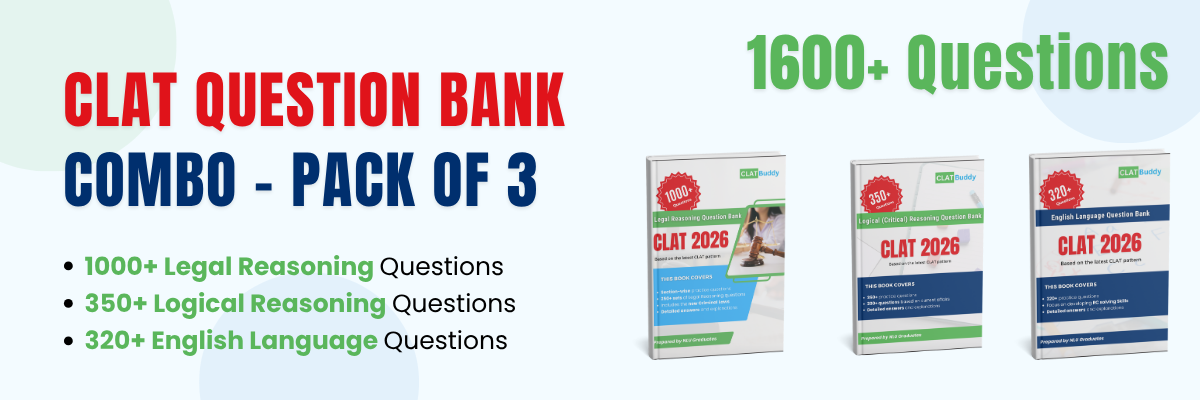How do I strengthen my vocabulary for CLAT?

Strengthening your vocabulary for CLAT is important not just for the English Language section, but also for improving your comprehension in other sections like Legal Reasoning and Current Affairs. Here are some practical and effective ways to enhance your vocabulary:
1. Read Daily
- Newspapers: Make a habit of reading good English newspapers like The Hindu or The Indian Express. Focus on the editorial and opinion sections as they use rich, diverse vocabulary.
- Magazines and Journals: Read magazines like The Economist, TIME, or India Today that provide in-depth articles with advanced vocabulary.
- Books: Fiction and non-fiction books expose you to varied vocabulary. Try reading classics or contemporary novels that challenge your language skills.
2. Maintain a Vocabulary Journal
As you read, jot down unfamiliar words in a notebook. Write the word, its meaning, and a sentence using that word. This helps in retaining new vocabulary.
Review this journal regularly to keep the words fresh in your memory.
3. Learn Words in Context
Don’t just memorise word lists; it’s more effective to learn words in context. When you see a word used in an article or a sentence, it’s easier to remember because you understand how it functions in a real situation.
For instance, if you encounter the word “mitigate” in a sentence like “The government took steps to mitigate the damage caused by the floods,” you’ll understand it means to reduce or lessen.
4. Use Vocabulary Apps
Use vocabulary-building apps to learn new words in a fun and interactive way.
These apps often have quizzes, games, and spaced repetition techniques, which help in retaining new words longer.
5. Learn Roots, Prefixes, and Suffixes
Understanding the roots of words (like bio- means life, auto- means self) can help you decipher the meanings of new words.
Similarly, learning prefixes and suffixes can make it easier to guess meanings. For example, words with the suffix “-logy” (biology, psychology) refer to the study of something.
6. Practice Synonyms and Antonyms
CLAT often asks vocabulary questions based on synonyms (words with similar meanings) and antonyms (words with opposite meanings). While learning new words, also learn their synonyms and antonyms.
For instance, if you learn the word “benevolent” (kind), you should also learn its synonyms like “generous” and antonyms like “malevolent” (evil).
7. Use Flashcards
Create flashcards with the word on one side and its meaning and an example sentence on the other. Regularly test yourself using these flashcards.
You can use apps like Quizlet or make physical flashcards. Flashcards are great for memorising words, especially when used for quick review sessions.
8. Solve Previous Year CLAT Papers
CLAT English sections often test vocabulary through reading comprehension passages, fill-in-the-blanks, or cloze tests. By solving previous years’ papers, you’ll get a sense of the kind of vocabulary CLAT expects.
After solving, highlight the unfamiliar words and add them to your vocabulary journal.
9. Practice with Word Games
Engage in word games or apps. These games improve vocabulary and are fun ways to learn new words without feeling the pressure of traditional study.
Even apps offer vocabulary-building activities that make learning interactive.
10. Use New Words in Daily Conversations
Incorporate newly learned words into your day-to-day conversations or writing. This helps reinforce them and ensures they become part of your active vocabulary.
You can also practice by writing short essays or articles using the words you’ve recently learned.
11. Test Yourself Regularly
Set weekly or bi-weekly goals to test yourself on the new words you’ve learned. Take online vocabulary quizzes or ask someone to test you. Regular testing helps you track your progress and highlights areas where you need improvement.
12. Learn Collocations and Phrases
Focus on learning collocations (words that are often used together). For example, “make a decision” is more natural than “do a decision.” Understanding such common word pairings will improve your comprehension and fluency.
Pay attention to idiomatic expressions, phrasal verbs, and commonly used phrases. CLAT can sometimes include these in comprehension questions.
13. Revise Regularly
Consistency is key to mastering vocabulary. Make it a habit to revise the words you’ve learned weekly. Spaced repetition, where you revise words at increasing intervals, helps in long-term retention. Don’t just focus on quantity. Make sure you can use each word accurately.
Find English Language Question bank is here.
14. Focus on Word Usage in Reading Comprehension
When solving reading comprehension questions, pay attention to how words are used in the passage. Often, understanding the context is key to answering vocabulary-based questions correctly.
Practice using past papers to apply your vocabulary knowledge in reading comprehension and close tests.
Conclusion
Building a strong vocabulary for CLAT is a gradual process. Regular reading, active practice, and revision are crucial. By consistently exposing yourself to new words and actively using them, you’ll improve both your vocabulary and your overall performance in the exam. Good luck!
Find English Language Question bank is here.
Calling all law aspirants!
Are you exhausted from constantly searching for study materials and question banks? Worry not!
With over 15,000 students already engaged, you definitely don't want to be left out.
Become a member of the most vibrant law aspirants community out there!
It’s FREE! Hurry!
Join our WhatsApp Groups (Click Here) and Telegram Channel (Click Here) today, and receive instant notifications.








